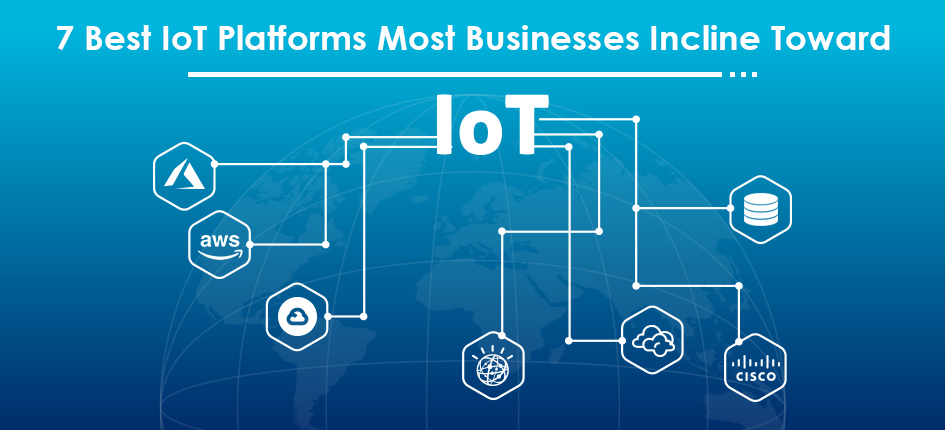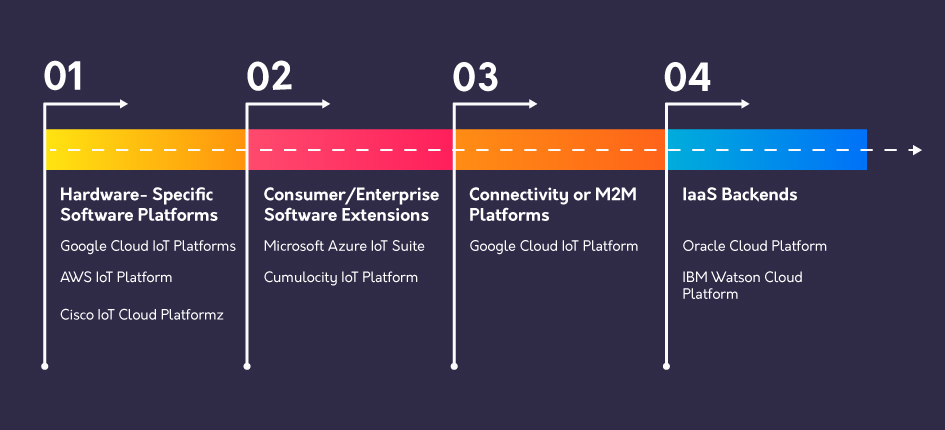7 Best IoT Platforms Most Businesses Incline Toward

The market of IoT platforms is making headway gradually, and it is expected to rake in a massive value of $74.44B globally by 2023. The reason behind the expansion of this market is the proliferation in the IoT devices and their correlated components. These devices and components need a facilitator – IoT Platform – to seamlessly communicate in the same environment and create maximum business value.
What is an IoT Platform?
IoT platform is a middleware solution that acts as a connector between the IoT devices and the cloud. It facilitates data exchange over the network and also connects the application layer to the hardware.
Currently, there are a plethora of IoT platforms in the market, each having its own significance in making IoT integration as well as management simpler and scalable. A reliable IoT development company counts on 7 IoT platforms for successful IoT implementation.
Microsoft Azure IoT Platform
It is an open-source, cloud-based suite that assists in bringing local intelligence to the shared/distributed IoT. This platform has virtual tools that offer a flexible and configurable computing environment. These tools can be easily be resized according to the workload.
To leverage the Azure IoT platform, the user has to pass the commands over Microsoft Azure PowerShell in order to start or stop the server as well as writing operations. However, this suite doesn’t offer any management.
Features:
- Supports instant IoT-enabled device registry that generates a unique identity for each device
- Provides a cloud-based dashboard to offer immediate access to data across apps and devices
- Enables real-time analytics streaming for the betterment of decision-making ability
- Offers remote monitoring solution to keep a tab of apps and devices
- Smoothens continuous data monitoring for actionable insights
AWS IoT Platform
AWS platform not only allows device connectivity to the cloud but also secures the integration of apps available on cloud and other devices. The merit of this platform is that it enables apps to analyze devices and facilitates 24*7 communication between them, without the need for an internet connection.
Features:
- Supports instant device and app connectivity and helps in exchanging authentic messages using HTTP or MQTT, or WebSockets protocols
- Provides a message broker that enables data communication between apps and devices with low latency
- Offers a device gateway to deal with all the connected device without maintaining infrastructure
- Gives a unique identity to devices to track metadata of connected systems
- Encrypts data exchange through authentication at every step
Google Cloud IoT Platform
It provides a comprehensive toolset to connect, process, save, and monitor data in the cloud and at the edge. Google provides fully-managed, scalable cloud services for on-premise/edge computing apps using the platform. This IoT platform also offers expanded AI capabilities to edge devices with Cloud IoT Edge. Besides, it identifies the device operations efficiency and performs firmware updates. Also, take note that only a few programming languages support app development on this IoT platform, while Google offers most tech-components.
Features:
- Supports device’s predictive maintenance and improves equipment efficiency in real-time
- Stores gathered data, performs complex analytics, and shows the connected device’s status
- Provides massive storage and reduces server maintenance cost
- Tracks location and condition of devices continuously
- Enables integration with other Google services
- Manages pricing on a per-minute basis
- Facilitates big data analysis
IBM Watson IoT Platform
It is a PaaS-based development Platform launched by IBM. This platform provides simple solutions for IoT app development services and makes it accessible for a novice. Moreover, it offers secure communication, real-time data exchange, and data sensor as well as weather data service. It has the potential to handle massive data and render improved customer service.
Features:
- Provides an open container architecture that offers convenient migration of workload to the cloud
- Analyzes unstructured data and comprehend the data-pattern to gain valuable insights
- Develops and connects devices to apps on the cloud seamlessly
- Provides dashboard for enhanced visualization
Cumulocity IoT Platform
It is an independent device and app management IoT platform, which enhances visibility and provides improved control over remote assets. Being an end-to-end cloud enablement platform, it makes data and asset management convenient for enterprises.
Features:
- Monitors data analytics in real-time by offering customizable dashboards
- Improves the existing services with simple workflow integrations
- Connects devices over any network with a plug-n-play approach
- Facilitates access through mobile, laptops, and desktops
Oracle IoT Platform
This platform offers endpoint management, real-time data analysis, and fast-paced messaging to send real-time alerts directly to user devices. It is Platform as a service-based cloud computing suite that facilitates device connectivity with the cloud and data monitoring from the devices to provide real-time insights and incorporate data with real-time web, application service, or Oracle Cloud services.
Features:
- Supports bi-direction communication between and the connected devices and the apps on the cloud
- Stores device’s metadata to comprehend the attributes, capabilities, and lifecycle of the connected devices
- Renders Oracle BI Cloud Service Support with enhanced data visualization
- Supports Big Data analysis
Cisco IoT Cloud Connect
This is a cloud-based, mobile platform that renders solutions for mobile operators and offers flexible deployment options for IoT devices. The key focus of this suite is data and voice connectivity, while Cisco Kinetic ensures the security of this platform. It also extracts IoT data from the components or devices connected to the IoT network to normalize it so that apps can use it. Additionally, this platform applies rules to the data in motion for the improvement of the decision-making ability of the enterprises.
Features:
- Supports data computation in a shared network that ensures optimal use of resources in the network
- Provides a cloud-based dashboard that offers better control and view of the IoT gateways
- Enable free data flow between the connected devices and the app based on cloud
- Provides real-time information and updates

IoT Platforms Driving Business Growth
IoT platforms play a significant role in creating business value and fueling their growth. But, they must tread carefully to choose the best one by taking factors like service provider’s SDK richness, support, documentation, and API interface into account. They should also assess the IoT protocols for billing base, message size limitations, and multi-tenancy support.
Be it choosing an IoT platform or availing IoT app development services, it is essential to analyze the nature and objectives of your business. You can also consult with the experts of a renowned IoT development company to help you find the best IoT platform and navigate your IoT implementation journey.

